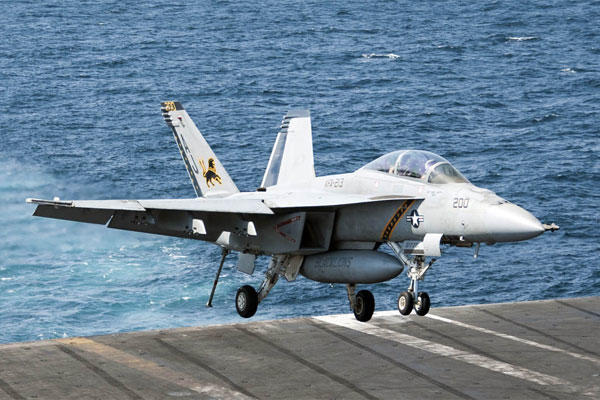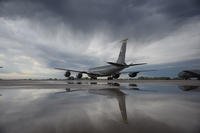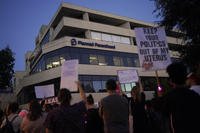The Pentagon's Inspector General has been investigating allegations that the military skewed intelligence to back frequent reports from the command of incremental but solid progress in the campaign against ISIS.
Defense Department officials and the office of Inspector General Jon Rymer declined comment on a New York Times report that overly upbeat assessments and "skewed" intelligence may have been fed to policy makers on the effort to defeat the Islamic State of Iraq and Syria (ISIS) in Iraq.
"The DoD IG does not confirm or deny the existence of, or comment upon, investigations or investigative issues," a spokeswoman for Rymer said.
Air Force Col. Patrick Ryder, a spokesman for U.S. Central Command, also declined specific comment but said, "The IG has a responsibility to investigate all allegations made, and we welcome and support their independent oversight," the Associated Press reported.
The issue is particularly sensitive in the defense and intelligence communities in the aftermath of charges of skewed intelligence on weapons of mass destruction in Iraq before the 2003 invasion.
The allegation of skewed intelligence could also be the result of bottle half-full, half-empty disputes that are common among intelligence analysts.
White House Press Secretary Josh Earnest said that President Obama "places a premium" on getting unvarnished intelligence assessments as well as a range of views on issues. "That yields, in the minds of our experts, the best, richest account of the facts on the ground," Earnest said. He added that the president is confident he is receiving honest intelligence assessments.
Ryder and other defense spokesmen have been candid in stressing that ISIS has proven to be a resilient and adaptive enemy, and they also have been vigorous in countering charges that the anti-ISIS campaign had bogged down.
Last week, Ryder disputed the remarks of retiring Army Chief of Staff Gen. Ray Odierno, who said that the fight against ISIS in Iraq was at a "stalemate."
During a rare news conference last week, Defense Secretary Ashton Carter brushed off a reporter who asked if the situation in Iraq was a stalemate.
"Well, then you can report that, but I'm not going to try to characterize it," Carter said. "I'm confident that we will succeed in defeating ISIL (another ISIS acronym) and that we have the right strategy, but it's complicated not just only in Iraq, as you indicate, but in Syria as well."
Obama, Carter, Joint Chiefs of Staff Chairman Gen. Martin Dempsey and others in the chain of command have consistently warned that the campaign to degrade and defeat ISIS will be costly and take years.
Related Video:
ISIS Propaganda Machine
They also have consistently reported steady progress in the campaign despite major setbacks in the fall of Ramadi, the provincial capital of Iraq's Anbar province, and the failure of the Iraqi Security Forces (ISF) to rout ISIS from the oil refinery city of Baiji for more than a year.
On Tuesday, Iraqi Prime Minister Haider al-Abadi said that victory in Baiji about 120 miles north of Baghdad was critical to the overall campaign against what he called "Daesh," an Arabic acronym for ISIS, and to the eventual plan to push to the northwest against Mosul.
"The Baiji battle is a challenge to the heart of Daesh and the fundamental existence of Daesh," Abadi said on a visit to commanders in Salahuddin province, where Baiji is located. "Victory in this battle is critical to ending Daesh's presence in Iraq," Abadi said.
Last week, in a video briefing to the Pentagon, Marine Brig. Gen. Kevin Killea said the situation on the ground in Baiji "remains hotly contested."
The city itself was mostly in the control of the Iraqi army but, "The oil refinery area is truly an attack-counterattack situation being played out on a daily basis," said Killea, the chief of staff for Combined Joint Task Force-Operation Inherent Resolve.
The situation was much the same in the effort to retake Ramadi, where the ISF has been bolstered by several hundred Sunni tribal fighters trained by the U.S. and is now seeking to isolate the city and cut off supply routes.
In Ramadi, "the counterattack continues in the isolation phase, with the ISF making daily progress," Killea said.
"The ISF are conducting operations on multiple axes and are executing their planned scheme of maneuver," he said. "It's a difficult fight, to say the least. Some days, one axis will advance significantly, and the next day that same axis will get delayed by heavy contact with the enemy or obstacles."
Killea and other defense officials have been cautious in assessing the situation on the ground around Ramadi following the briefing to the Pentagon given last May by Marine Brig. Gen. Thomas Weidley.
On May 15, Weidley said that ISIS was "losing and remains on the defensive." Two days later, Ramadi fell to ISIS.
In Congress, much of the criticism of the progress reports on the anti-ISIS campaign in Iraq has centered on the effectiveness of the U.S. and coalition airstrikes. In numerous hearings, Sen. John McCain, R-Arizona, and others have charged that the vast majority of missions flown by the U.S. do not result in airstrikes.
At a Pentagon briefing Monday, Air Force Chief of Staff Gen. Mark Welsh and Air Force Secretary Deborah Lee James said that the air campaign was unique in its efforts to avoid civilian casualties, or collateral damage.
"The precision that we have used in this campaign is unprecedented in the history of warfare, and it means that we have minimized the loss of innocent life," James said. "And we've accomplished all of this with an enemy that wraps itself around the civilian populations who thinks nothing of killing anyone who is not them."
The military has flown nearly 70,000 sorties over Iraq and Syria since the campaign against ISIS began last summer. Actual air strikes began last Aug. 8.
Since then, the Air Force has flown more than 48,000 of the sorties, or about 70 percent of the total, Welsh said. About 6,200 of those sorties have resulted in airstrikes, according to CentCom.
Welsh declined to give a ratio on the number of sorties in which munitions were dropped and the number in which the aircraft returned without bombing but said that many of the 48,000-plus sorties were Intelligence Surveillance Reconnaissance (ISR) sorties. "I don't know the specific number," he said.
"Some of it is tanker sorties, about 14,000 or so tanker sorties," Welsh said. "And then there are a number of sorties where people take off with weapons on board to be ready to conduct a strike if a target is found -- we call it 'dynamic targeting.'"
"Remember, we're not at war with Iraq, and so we don't want to drop bombs indiscriminately in Iraq and injure the citizens and destroy the property of the Iraqi people and Iraqi government, and so we have to have a target that we can validate," Welsh said.
"We have to go through our collateral damage estimate to make sure that we're not going to hurt anyone other than the intended target. And if we can't get through that in time, we bring the ordinance home. I don't know any other way to approach this."
--Richard Sisk can be reached at Richard.Sisk@military.com































